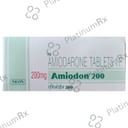Amiodarone
Uses
Amiodarone is used in the treatment of arrhythmia.
How it Works
How Amiodarone Works Amiodarone is an anti-arrhythmic medication that regulates the heartbeat by blocking abnormal electrical signals in the heart.
Side Effects
Common side effects of Amiodarone include nausea, constipation, slow heart rate, changes in taste, eczema, decreased levels of thyroid hormones, vomiting, corneal microdeposits, photosensitivity, decreased libido, insomnia, hyperthyroidism, increased liver transaminases, jaundice, liver failure, extrapyramidal symptoms, nightmares, pulmonary toxicity, and skin pigmentation.
Expert Advice
- Amiodarone may cause blurring of vision. Avoid driving or any activity requiring focus until you understand how it affects you.
- It increases your skin's sensitivity to sunlight. Use sunscreen and wear protective clothing when outdoors.
- Your doctor may perform regular blood tests, chest X-rays, ECG, eye tests, and thyroid, liver, and lung function tests while you are taking this medication.
- Notify your doctor if you experience any of the following symptoms:
- Breathlessness
- Persistent cough
- Jaundice
- Restlessness
- Weight loss or gain
- Eye problems
- Inform your doctor about all other medications you are taking, as Amiodarone can interact with many drugs.
- Notify your doctor if you are pregnant, planning to become pregnant, or breastfeeding.
Related Medications
Amiodarone 100mg

₹41.3
MRP ₹64.5
Amiodarone 100mg

₹55

₹41.3
MRP ₹64.5
Amiodarone 100mg

₹75.5

₹41.3
MRP ₹64.5
Amiodarone 100mg

₹98.4

₹41.3
MRP ₹64.5
Amiodarone 100mg

₹65.6

₹41.3
MRP ₹64.5
Amiodarone 100mg

₹56.3

₹41.3
MRP ₹64.5
Amiodarone 100mg

₹33.7

₹41.3
MRP ₹64.5
Amiodarone 100mg

₹58

₹41.3
MRP ₹64.5
Amiodarone 100mg
₹103.2

₹41.3
MRP ₹64.5
Amiodarone 200mg

₹115

₹84.6
MRP ₹120.8
Amiodarone 200mg

₹99

₹84.6
MRP ₹120.8
Amiodarone 200mg

₹119.1

₹84.6
MRP ₹120.8
Amiodarone 200mg

₹117.7

₹84.6
MRP ₹120.8
Amiodarone 200mg

₹110

₹84.6
MRP ₹120.8
Amiodarone 200mg

₹84.6
MRP ₹120.8
Amiodarone 200mg

₹116

₹84.6
MRP ₹120.8
Amiodarone 200mg

₹133.5

₹84.6
MRP ₹120.8
Amiodarone 200mg

₹124.1

₹84.6
MRP ₹120.8
Amiodarone 200mg

₹125

₹84.6
MRP ₹120.8
Amiodarone 200mg

₹172

₹84.6
MRP ₹120.8
Amiodarone 200mg

₹126

₹84.6
MRP ₹120.8
Amiodarone 150mg

₹66.6

₹54.6
MRP ₹66.5
Amiodarone 150mg

₹161

₹54.6
MRP ₹66.5
Amiodarone 150mg

₹66.2

₹54.6
MRP ₹66.5
Amiodarone 150mg

₹75.1

₹54.6
MRP ₹66.5
Flat ₹100 off on first app order | Use Code: APP100 |
Flat ₹100 off on first app order
USE CODE: APP100

Download Now